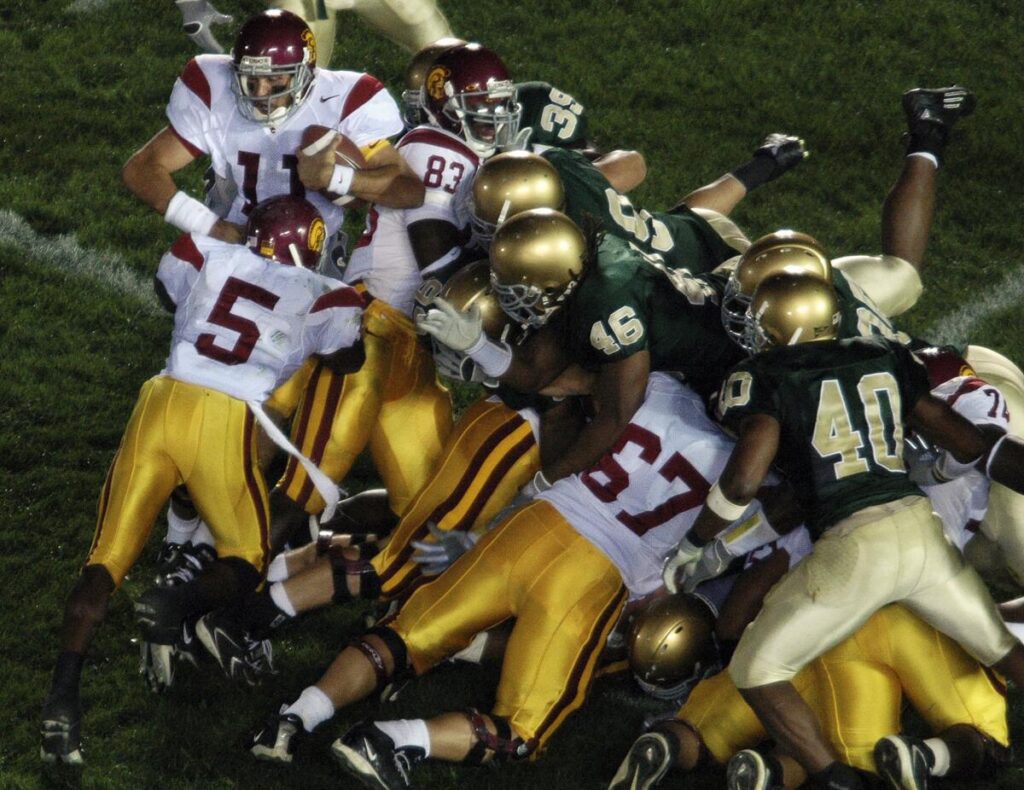Lincoln Riley shouldn’t take all the blame if the USC-Notre Dame rivalry ends
Ryan Kartje (LA Times) — One of college football’s most storied rivalries is at a crossroads. A century after it was played for the first time, the historic series between USC and Notre Dame is at serious risk of ending. A lot of fans, former players and college football purists are upset about it. Most of them are pointing fingers at USC — and at Lincoln Riley especially.
I think there’s a little more to the situation than that. But the reason USC’s coach finds himself at the center of that frustration stems from comments he first made last summer during Big Ten media day, comments that explain quite transparently where USC stands right now, almost a year later.
USC and Mississippi had just canceled a home-and-home series, and rumors were swirling that Riley had pushed administrators to pull out of last September’s matchup with Louisiana State too. When he was asked what led to those changes, Riley didn’t hide his feelings about how scheduling should be handled. Why would any power conference school schedule marquee nonconference games in the future, he wondered aloud, unless there were “more guaranteed [College Football Playoff] spots in some of these conferences.” Otherwise, he predicted, those games would happen “less and less.”
“Our schedules are already going to be so good,” Riley said. “At some point, you’re like, alright, is the juice worth the squeeze in terms of playing these games?”
Before we address how that logic applies to Notre Dame — and before you start screaming “COWARD!” at your phone/computer screen — let’s acknowledge the fact that Riley has a point. He is paid — more than all but a few coaches in the sport — to get USC to the College Football Playoff. Period. And as the playoff is currently constructed, there is no real incentive, on paper, for a coach such as Riley to want an extra marquee nonconference game on the schedule. Remove 95 years of context with the Irish and, to his point, the juice probably isn’t worth the squeeze.
This issue runs far deeper than just Notre Dame and USC, but let’s address the golden-domed elephant in the room, since Notre Dame’s athletic director has the college football world worked into a lather.
This is what Riley said about the rivalry last summer:
“If you get in a position where you’ve got to make a decision on what’s best for SC to help us win a national championship versus keeping that, shoot, then you gotta look at it. I mean, listen, we’re not the first example of that. Look all across the country — there’s been a lot of other teams [that] sacrifice rivalry games. I’m not saying that’s what’s going to happen, but you know, as we get into this playoff structure, and if it changes or not, we’re in this new conference, we’re going to learn something about this as we go.”
And boy did USC learn something on the road in its Big Ten debut. The Trojans unraveled on all four of their conference road trips. They realized how hard it would be to mix in an October trip to South Bend during that annual gauntlet. No other Big Ten teams have that challenge on the Trojans’ particular timeline. Not to mention there’s a possible Southeastern Conference-Big Ten crossover matchup to consider in the future.
Automatic qualifiers to the College Football Playoff are the quickest way to solve this problem, as far as USC is concerned. It would give teams such as USC comfort that a loss to a nonconference opponent in September wouldn’t keep them out of the playoff. However, it would also mean rendering games such as USC-Notre Dame mostly meaningless as far as playoff resumes go.
USC is choosing to take the cold, calculated route when it comes to this quandary. And I understand why. Why should the Trojans be expected to carry the water for the soul of college football at the cost of their own playoff odds, while the rest of the sport’s leaders, USC’s own included, have made clear just how much tradition actually means to them?
Don’t get me wrong. USC isn’t being brave with its stance. It’s openly acknowledging that it is choosing the route of least resistance, no matter how its fans may feel about it. That’s not exactly valiant. And by calling them out for holding up negotiations, Notre Dame’s athletic director has already won the PR battle. If the rivalry ends after this season, the narrative will forever be that USC killed it with cowardice.
I do think that narrative would ignore some key points. Notably that USC hasn’t said it wants to end the game. Only that it doesn’t want a long-term contract before it understands the parameters of the playoff. Nor was Notre Dame interested at all in having a conversation about any concessions to USC’s situation, such as an early season date for the game, to help get a deal over the finish line. If these negotiations were simply about maintaining the rivalry, Notre Dame would have agreed to play next season already. This isn’t a one-sided stalemate.
I know that USC athletic director Jennifer Cohen would prefer to continue the rivalry with Notre Dame. I know she understands how much equity she could lose if it doesn’t continue.
I also have no doubt that she will take the heat, if necessary, for its demise, if it means putting USC on a better path to the College Football Playoff.
Is that hope of a playoff worth losing a storied rivalry? I’d understand if you said no. But USC leaders have made abundantly clear how they feel about that question. Let’s hope they never have to answer it.
Extra points
Will Saint Thomas walk onto the court with the Trojans next season? (Gina Ferazzi / LAT)
—USC basketball still has two roster spots available for the 2025-26 season. One is currently being held for Saint Thomas. But it’s not clear how much longer Eric Musselman and his staff are willing to wait on Thomas’ appeal to the NCAA. The sentiment within the program was that Thomas had a compelling case for a mental health waiver, but the gears of justice grind slowly with the NCAA, and Thomas is running out of time. Summer practice kicks off on June 9. If he isn’t granted an extra year, expect USC to fill that spot with a low-major, all-conference-type point guard who could initiate the offense when called upon.
—Six-foot-10 sophomore forward Jacob Cofie is one to watch this summer. USC’s staff is very bullish on the young big man. One person with close knowledge of the program told The Times that they expect Cofie to be on draft boards by the start of Big Ten season. Along with Utah transfer Ezra Ausar — who stands 6-8, 242 pounds — Cofie should give USC much more of a physical presence in the paint, something it sorely lacked last season.
—Leaders from the Power Four conferences are floating a binding document that would force schools to fall in line with the new NIL enforcement entity … or else. It won’t work. I, for one, would love to see the Big Ten try to kick USC or Michigan or Ohio State out of the conference for not bending the knee to the new College Sports Commission. But more critically here, there’s no way that such an agreement would pass legal muster. College sports can’t supersede state law, no matter what some galaxy-brained commissioners might think.
—The College Football Playoff field will no longer give the four highest-rated conference champions an automatic first-round bye. That change to “straight seeding” was unanimously approved last week by CFP leaders, after the initial format last season was received poorly pretty much everywhere outside of Tempe, Ariz. In the new format, the committee’s top-four rated teams will be ranked one through four and get that coveted bye, no matter if they won their conference or not. That might sound like a tedious change. But this is better for everybody.
latimes.com
______________
TrojanDailyBlog members — We always encourage you to add factual information, insight, divergent opinions, or new topics to the TDB that don’t necessarily pertain to any particular moderator post or member comment.

